President’s column
At the beginning of the New Year 2021
By Ikuzo Kobayashi, Chairman of NPO Salaam Kai
Happy New Year 2021.
We are in the midst of a third wave of the pandemic COVID-19 which has continued to spread since last year, and Japan is under a state of emergency. The inauguration ceremony of President Biden was held on January 20 in the United States, but the new administration has set sail in the turmoil. China is taking advantage of the political confusion of the United States to increase its offensive to change the status quo by force in Asia. Factors of instability remain in the Middle East due to the existence of Islamic extremists such as al-Qaeda and the Islamic State as well as Iran aiming for export of revolution to the Arabian Peninsula.
Under these circumstances, can Japan advance its own peace, security and prosperity and bring peace to Asia and the Middle East?
Japan launched its journey in the Middle East from 1960
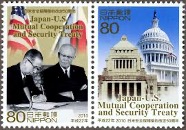
After World War II, with the San Francisco Treaty, Japan regained its sovereignty and expressed its determination to be a peaceful nation to the world. Japan was riding the wave of high economic growth, while relying its defense heavily on the United States.
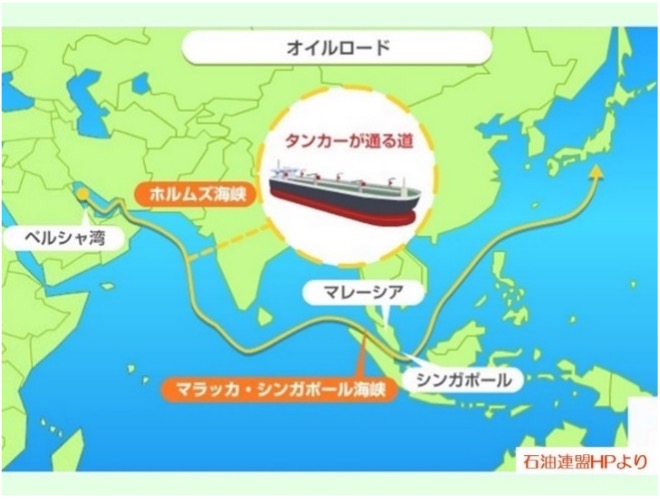
It was in 1960 that Japan became an object of expectation as a country that could play a major role in the peace and prosperity of the world. This is because Japan was able to be clearly identified with the western camp of the Cold War between East and West by approving the New Japan-US Security Treaty. In addition, the path of “voluntary crude oil development”, which has been the national policy after the war, has been opened. With the stable import of cheap crude oil, Japan’s chemical technology grew steadily like fish in the water and continued to drive the Japanese economy in general.
Middle Eastern crude oil has provided a stable supply of primary energy and secondary energy (electricity). Since energy is the cornerstone of economic development, the whole country of Japan promoted friendship with the Middle East, and Japan’s relations with the Gulf countries, which are oil-producing countries, rapidly deepened as a new bond after the war. The former maritime Silk Road has been transformed into an oil road for large crude oil tankers.
Japan’s economic development premised on peace in the Middle East
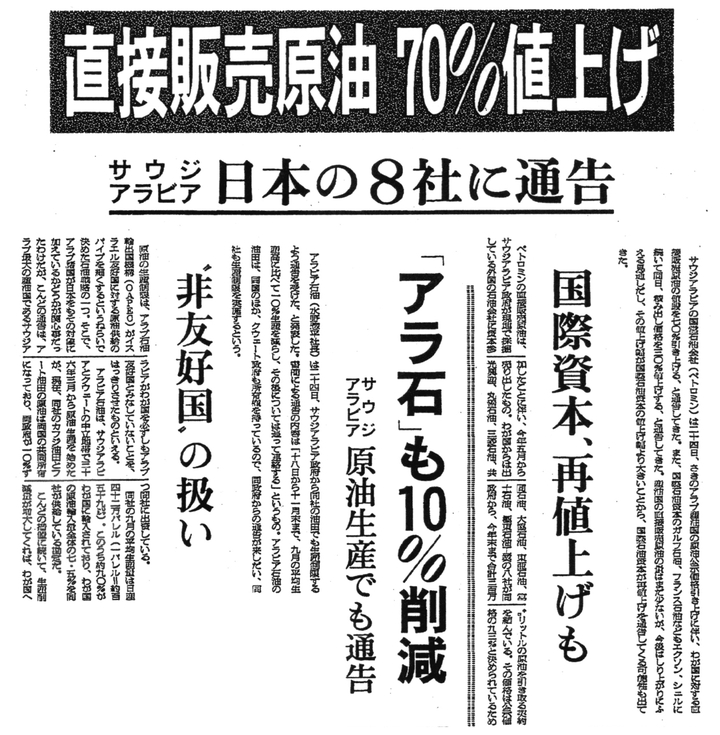
Toyota Motor’s 75 Years History (Asahi Shimbun October 25, 1973)
As voluntary crude oil imports increased steadily, Japan’s dependence on the Middle East for energy resources increased, and friendship with the Arab countries in the Middle East expanded. It was the first oil crisis that chilled Japan’s relationship with the Arab countries. In the Fourth Middle East War of 1973, OAPEC (Organization of Arab Petroleum Exporting Countries) member Arab countries urged that Gulf countries should also raise the official crude oil price to help Egypt and Syria fight Israel, and decided on 70% price increase.
There is no doubt that Japan has deepened its friendly relations with the Gulf Arab countries, but in terms of diplomacy and security, Japan stood on the side of Israel through Japan-US Security Treaty. In other words, Japan pursued a dual diplomatic posture, standing on the Israeli side in diplomacy and security and on the Arab side in the economy. In order for this dual posture not precipitate into dichotomy, it was premised that there would be no war between Arabs and Israel and that peace would be maintained. From that point of view, it can be said that the Middle East was ‘the powder keg of the world’ and Japan had to be most afraid of its explosion.
2021, 30 years after the Gulf War
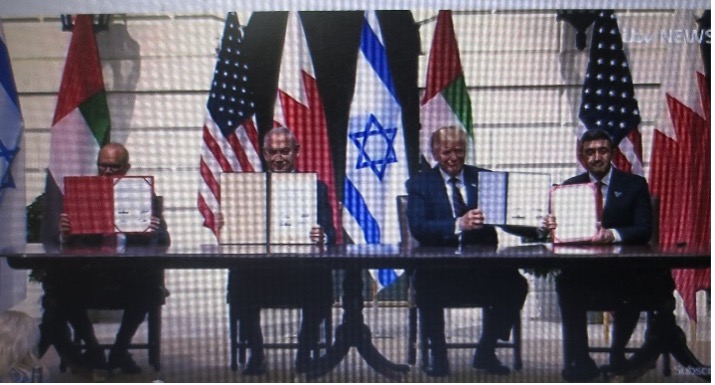
UAE and Bahrain agree to normalize diplomatic relations with Israel on September 15, 2020. At the White House (YouTube from ITV News)
This year marks the 30th anniversary of the Gulf War, in which a multinational force led by the United States, Britain and France pushed back the Iraqi army invading Kuwait. In Iraq, Iranian militia operations and terrorist attacks by the remnants of the Islamic State continue. Prime Minister Al-Kadhimi of Iraq, who takes pro-US position, is in the process of calming the nation’s political instability, but the current situation of relying on crude oil for 90% of the national revenue and the slump in crude oil prices due to the new corona pandemic are posing challenges.
On the other hand, Kuwait is in a position to defend against Iran’s attempts to export revolution along with Saudi Arabia and other Gulf countries (GCC). While the United Arab Emirates (UAE) takes a posture to actively confront Iran through military, diplomacy and nuclear power, Kuwait is not taking such posture. Kuwait was put on the brink of destruction 30 years ago during a military invasion by Saddam Hussein of Iraq. Kuwait may not have been liberated unless Saudi Arabia allowed multinational forces to station within its territory. Because of its gratitude for its liberation, Kuwait is expected to join the Saudi Arabia to pursue the diplomatic normalization with Israel in the larger movement of the UAE, Bahrain and Sudan normalizing diplomatic relations with Israel last year.
Changes in the situation in the Middle East and Japan
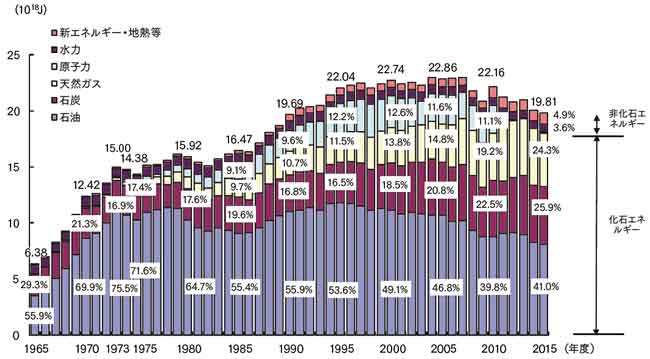
Trends in domestic supply of primary energy (from the Outline of Energy Demand by the Agency for Natural Resources and Energy, Ministry of Economy, Trade and Industry)
The Middle East has long been called the ‘powder keg of the world’, but the situation in the Middle East has changed dramatically. The period when the explosion of the ‘powder keg’ was feared is the period of 30 years from 1960 until the Gulf War. There are two main reasons for this.
The first is that the Cold War confrontation that divided the world into two camps was resolved by the collapse of the Berlin Wall in 1989. As a result, the crisis that the confrontation of ‘Israel vs. Arab countries’ in Middle East wars repeated three times may be linked to the global confrontation of the East-West Cold War disappeared. Therefore, the Gulf Crisis was unlikely to escalate into a crisis that would lead to World War II from the beginning, and was likely to remain as a regional hegemony dispute within the Middle East.
However, Saddam Hussein certainly tried to link with pan-Arabism, anti-Semitic and anti-Christian nations, and anti-Iranian radical Shia groups to expand the crisis into world conflict, but failed. His effort turned out to be in vain. It was reasonable to assume that his original intention to commit an aggression to alter the geopolitical status quo of the Gulf region, starting with Kuwait.
Another reason is the decline in dependence on the Middle East in crude oil demand in countries around the world. Since the oil crisis, the world has reduced its dependence on the Middle East for crude oil imports. Moreover, Russia, China and other non-OPEC oil-producing countries have disrupted the OPEC cartel strategy.
Japan also reduced the dependence on crude oil for primary energy source from 75.5% in 1973 to 41.0% in 2015.
The era when the Middle East was called the ‘powder keg of the world’ was over.
‘Middle East powder keg’ = rise of radical Islamism
1The 1979 Iranian Islamic Revolution stimulated Islamic fundamentalists, especially Sunni Islamic extremists derived from the Muslim Brotherhood, as an achievement of successful establishment of an Islamic Republic state. It was manifestation of a desire for Sunni republics, and inspired them to move toward radical Islamism, which condemns the existing Arab Republics, kingdoms and emirates as not being the original Islamic states.
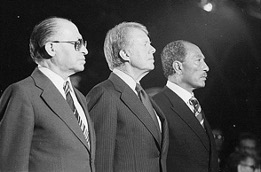
Camp David Agreement; From September 5 to September 17, 1978, US President Jimmy Carter invited Egyptian President Anwar Sadat and Israeli Prime Minister Menachem Begin to Camp David, the presidential retreat in Maryland and held a tripartite meeting. (From Wikipedia)
The artillery lieutenant who assassinated President Anwar Sadat, who received the Nobel Peace Prize for his achievement of signing the peace treaty with Israel, belonged to the Egyptian Islamic Jihad (a sect of Islamic extremists derived from the Muslim Brotherhood), and Usama Bin Laden who was associated with the group founded Al Qaeda.
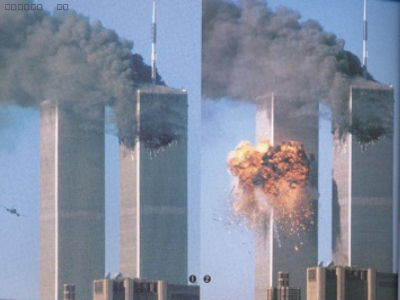
He took part in the Mujahedeen struggle against the Soviet Union’s invasion of Afghanistan, defeated the atheistic communist state Soviet Union and gained confidence. Returning to Saudi Arabia as a Mujahedeen hero, Bin Laden reportedly urged King Fahad that the entire Saudi Arabia including holy sites is a sanctuary and should not allow entry of pagan troops during the Gulf Crisis. Not only was the repulsion of Iraqi troops by Islamic extremists centered on al-Qaeda considered an outrageous idea, but the proposal which does not contribute to the resolution efforts centered on the United Nations was rejected.
When the subject of a person’s faith that should be peace and construction is replaced by battle and destruction, God leaves him. The 9/11 terrorist attacks in the United States were nothing more than atrocities against God and humanity.
Powder Keg in the Middle East’ coming to the end
Then, what is the contents of the ‘powder keg of the Middle East’?
Saddam Hussein attempted to escalate the battle to the world crisis during the Gulf Crisis, but failed. He was defeated and the Gulf War ended as the end of the era of his regional hegemony.
Meanwhile, a network of Islamic extremists centered on al-Qaeda was spread all over the world, culminating in the 9/11 terrorist attacks. The cruel and outrageous act of terrorism pushed the world into a ‘war on terrorism’. US President George W. Bush escalated the war from the Afghan War to the Iraq War. Although doubts remain about the Iraq War as a strategy to hunt down Islamic extremists with al-Qaeda at the helm, the subsequent pursuit and successful killing of Usama Bin Laden in 2011 put Al Qaeda to an end.
Iraqi-based Islamic extremists saw the spread of the ‘Arab Spring’ movement from 2011 as an opportunity. They overthrew the Ben Ali administration in Tunisia, helped the election of Islamist President Morsi in Egypt and pushed Syria into a state of civil war. Ultimately, ISIS or the Islamic State declared establishment of a state whose territory straddles Iraq and Syria, has declared the establishment of a nation. Subsequent reign of terror and terrorist attacks by them shook the world. However, their momentum came to an end within three years.
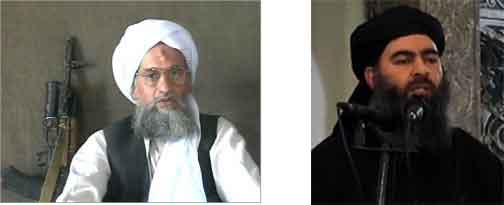
Left) Ayman al-Zawahiri, who became the head of al-Qaeda as the successor to Osama Bin Laden. Currently on the run.
Right) Abu Bakr al-Baghdadi, known as the “Islamic State” caliph, was killed by US troops in November 2020.
At this point, the ‘powder keg of the Middle East’ is Sunni Islamic extremism and Iranian Islamic extremism justified in the name of the Holy War. Therefore, the pro-American Islamic moderate nations have clearly highlighted the confrontation between the Sunni al-Qaeda, Islamic State, Hamas, Boko Haram and other Islamic extremists on one side and the Iranian revolutionary operating force Hezbollah, the Revolutionary Guard Corps, controlled by Iran on the other side.
Japan’s role
It has been 60 years since Japan’s relationship with the Middle East began. Japan has deepened its ties with the Middle East and Gulf countries by importing crude oil. The Middle East is about to open up a new era of construction and development. Middle Eastern countries highly evaluate Japan’s infrastructure reconstruction technology, medical, chemical, nuclear power generation technology, are familiar with Japanese culture such as cartoons and animation, and welcome creation of peace by Japan’s dispatch of the Self-Defense Forces overseas including PKO.
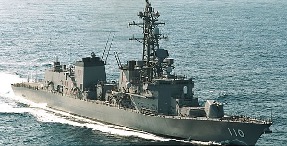
Escort ship “Takanami” departed for the northern part of the Arabian Sea on February 2, 2020 to ensure safe navigation of Japanese vessels in sea lanes.
As the US-China conflict continues to intensify, Japan’s self-defense is not limited to the East China Sea and South China Sea. Japan should express its determination to take over the existing defense activities by the United States as much as possible from the Indonesian waters to the Straits of Malacca, the Indian Ocean, the North Arabian Sea, and Somalia’s eastern coast in Africa.
Collective self-defense is premised on active efforts to fulfill Japan’s own responsibility of homeland defense, and it cannot contribute to the peace of other countries without such efforts.
Former Prime Minister Abe, who knows well that Middle Eastern countries seek peace and trust Japan, set forth ‘Proactive Contributions to Peace’ diplomacy and its time has come. It is the role of Japan in the future to promote it as a more fruitful one. I hope that it will be inherited by the Suga administration.
(From second article on Salaam Quarterly Bulletin No.36 published on February 11, 2021)
President’s column Contents
25. Feb. 2012 Welcome to the website of Salaam Association!
15. Jun. 2011 The Silk Road on the Sea in the New Millennium
最近の投稿
Hello!
Hello! How are you?
